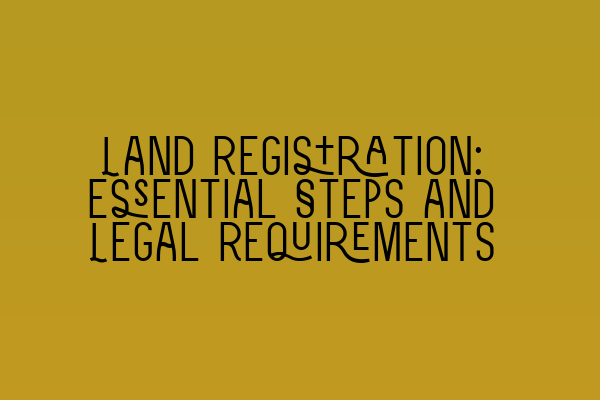Land Registration: Essential Steps and Legal Requirements
Welcome to the blog of SQE Property Law & Land Law! In today’s article, we will be discussing the essential steps and legal requirements involved in land registration. Land registration is a crucial process that provides security and certainty to property owners, buyers, and lenders. The registration process confirms legal ownership and provides an official record of property rights and interests. Let’s dive into the essential steps and legal nuances you should be aware of.
Step 1: Obtain Official Copies of Documents
Before initiating the land registration process, it is essential to obtain official copies of all relevant property documents. These documents include conveyances, transfers, leases, and any other legal instruments affecting the property. These copies serve as evidence of ownership and will be required during the registration process.
For a comprehensive review of the legal concepts related to land registration, we recommend you check out our article on SQE 1 Practice Exam Questions for a great review of the concepts.
Step 2: Complete the Application Forms
Once you have your official copies of the property documents, the next step is to complete the application forms for land registration. The forms can be obtained from the Land Registry’s official website or by contacting your solicitor.
Completing the application forms requires attention to detail and accuracy. It is crucial to provide all the necessary information, such as the property’s address, description, and any rights or restrictions affecting the property. Failure to provide accurate information may lead to delays or complications in the registration process.
Step 3: Submit the Application
After completing the application forms, you’ll need to submit them to the Land Registry along with the required fee. The fee amount will vary depending on various factors, such as the value of the property and the type of application being made.
Once the application and fee have been submitted, the Land Registry will begin processing your application. This process may take several weeks, so it’s essential to submit the application well in advance if you have any time constraints.
If you’re looking for a comprehensive preparation course for the SQE exams, consider checking out our SQE 2 Preparation Courses. These courses are designed to help you succeed in your exams and build a strong foundation in property law.
Step 4: Examination and Verification
During the registration process, the Land Registry will examine and verify the application and supporting documents. This examination involves reviewing the accuracy and completeness of the information provided, as well as verifying the authenticity of the documents.
If any issues or discrepancies are identified during this stage, the Land Registry may contact you or your solicitor for clarification or further evidence. It is essential to respond promptly and provide any requested information to ensure a smooth registration process.
Step 5: Registration and Official Records
Once the Land Registry completes its examination and verification process, and if everything is in order, your application will be approved, and the property will be registered in your name. A title number will be assigned to your property, and an official register will be created, detailing your ownership and any relevant rights and interests.
If you’re preparing for the SQE exams, don’t miss out on our highly recommended SQE 1 Practice Mocks FLK1 FLK2 that will help you assess your knowledge and boost your confidence.
Final Note
Land registration is a critical step in protecting your property rights and interests. It provides certainty to property owners and creates a transparent system for property transactions. By understanding the essential steps and legal requirements involved in land registration, you can navigate the process smoothly and efficiently.
If you have any questions or need assistance with land registration or any other property law matter, feel free to reach out to SQE Property Law & Land Law. Our team of expert solicitors is here to provide you with professional advice and guidance to ensure a seamless experience.
For more information on the upcoming SQE exam dates, please visit our website’s dedicated page on SRA SQE Exam Dates.
Thank you for reading our blog post on land registration. We hope you found it informative and useful. Stay tuned for more articles on property law and land law from SQE Property Law & Land Law!
